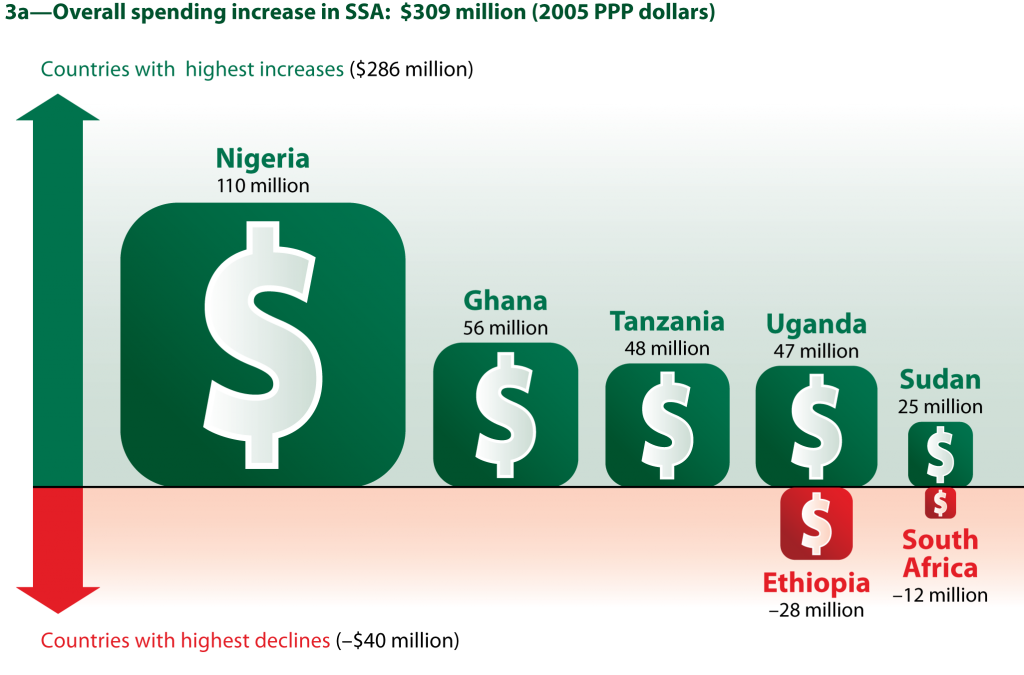African Countries and development agencies have been called upon to invest more in agriculture research if the respective African countries are to improve their agriculture productivity and meet their anti poverty targets.
The call was made by the International Food Policy Research Institute while releasing a new report on Agriculture Research and Development.
The report shows that investment in agricultural research and development (R&D) in Sub-Saharan Africa increased by more than 20 percent from 2001-2008, but most of this growth occurred in only a handful of countries. The report shows that Nigeria alone accounts for one-third of the increase.
The report is a result of a collaboration between IFPRI’s Agricultural Science and Technology Indicators (ASTI) initiative with more than 370 agricultural research agencies in Sub-Sahara Africa. ASTI is spearheaded by IFPRI on behalf of the Consultative Group on International Agricultural Research (CGIAR).
“Studies show that investments in agricultural R&D have greatly contributed to economic growth, agricultural development, food security, and poverty reduction in developing regions over the past five decades,” said Nienke Beintema, head of ASTI.
“New agricultural technologies and crop varieties have helped to increase yields, improve nutrition, conserve natural resources, and expand rural markets,” Beintema said during a teleconference to release the report.
The report a result of a survey in 32 countries expresses concern that spending in most of the region has stagnated or fallen, and urgent investment is needed to rescue the situation.
Gert-Jan Stads, ASTI program coordinator says the state of agricultural R&D is particularly grave in francophone West Africa, where insufficient national investment has left programs debilitated and dangerously dependent on volatile external funding. Gabon, Gambia and Sierra Leone were at the lowest end of funding agriculture research and development. Many of these countries are also struggling with a rapidly aging pool of scientists, many of whom will approach retirement within the next decade, the IFPRI researchers said.
The IFPRI Report on Agriculture Research in Africa
[issuu layout=http%3A%2F%2Fskin.issuu.com%2Fv%2Flight%2Flayout.xml showflipbtn=true autoflip=true autofliptime=6000 documentid=110409161548-4576e7a603a94abfb703dce540aa7615 docname=africa_agriculture_research username=weinformers loadinginfotext=Agriculture%20research%20Investment%20in%20Africa showhtmllink=true tag=ifpri width=500 height=324 unit=px]
The report found that investment in agricultural R&D had rebounded in many of the larger countries, primarily Ghana, Nigeria, Sudan, Tanzania, and Uganda. However, in 13 countries, spending actually declined. Even where funding did increase, much of the money went to boost low salaries and rehabilitate infrastructure and equipment after years of neglect.
Most countries in the study are facing human capacity challenges, such as recruitment freezes, retention problems, and researchers who either lack high-level training or are old and nearing retirement, according to the report.
Yet the researchers say well-developed, funded, and staffed agricultural research programs are crucial if farmers are to be more productive and prosperous in the future. The report shows, that only a few countries are making the necessary investments. In 2008, only eight countries in the study—Botswana, Burundi, Kenya, Mauritania, Mauritius, Namibia, South Africa, and Uganda—spent more than one percent of their agricultural GDP on research and development, the target set by the New Partnership for Africa’s Development (NEPAD). Moreover, many countries still depend on donors for funding, which is often short-term and unpredictable, leaving programs vulnerable and hampering long-term planning.
To address the challenges hindering agricultural R&D in Africa, the report calls for increased, consistent, and coordinated funding among governments and donors to counteract decades of underinvestment in agricultural R&D; improved recruitment and training, and expanded investments in agricultural higher education to resolve human resource capacity issues; and increased regional and sub-regional cooperation in agricultural R&D to pool resources, share information and innovations, and maximize the benefits of research.
“In the face of escalating challenges to food security, such as rapid population growth, climate change, water scarcity, and volatile food prices, investing in agricultural research is more important than ever,” said Gert-Jan Stads.
He said although there has been renewed interest in the role of agriculture in tackling hunger and poverty in recent years, governments, donors and development banks should translate this political support “ into action if the immense potential of agricultural research is to be realized.”
The IFPRI researchers say investing in agriculture research is vital for the development of agriculture and ensuring food security.
Also see
Country Specific agriculture research trends
Absolute Levels of R&D Spending and Staffing by Country
Spending: Overall and Countries with Greatest Increases & Decreases
Spending: Annual Growth Rates by Country
“Best Bets” for Agricultural Research at Global and Regional Levels

